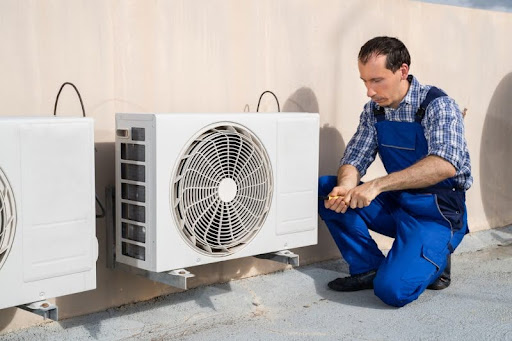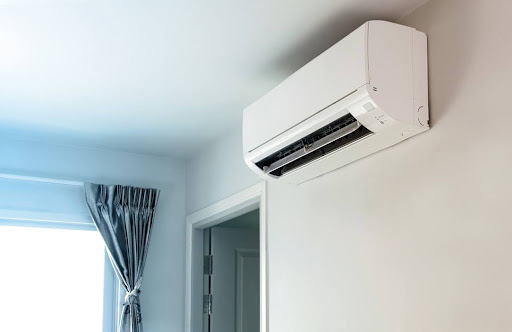If you’ve noticed your home’s cooling system isn’t performing as it should, a faulty AC compressor might be the culprit. The compressor plays a pivotal role in the air conditioning process, and when it malfunctions, it can lead to diminished cooling efficiency or even complete system failure. Recognizing the signs of a failing compressor is crucial for timely repairs and to avoid discomfort during hot weather. Let’s delve into the key indicators that signal a problematic AC compressor.
Common Signs of a Bad AC Compressor
Recognizing the signs of a failing AC compressor can help you address the issue before it causes further damage to your cooling system. Here are some common signs that indicate your AC compressor may be failing:
The AC Compressor Unit Vibrates When Starting
If you notice excessive vibration coming from your outdoor unit when you turn on your air conditioning, it could be a sign of a failing compressor. The compressor may be struggling to start or experiencing internal damage, resulting in vibrations.
No Cool Air Coming from AC Vents
If your AC system is blowing warm or room-temperature air instead of cool air, it could indicate a problem with the compressor. Low refrigerant levels due to a faulty compressor can lead to inadequate cooling performance.
Loud or Unusual Noises Coming from the AC Air Compressor
Strange noises coming from your outdoor unit, such as grinding, screeching, or banging sounds, are a clear indication that something is wrong. These noises may be caused by a failing compressor or other mechanical issues within the unit.
Frequent On and Off Cycling of the AC Air Compressor
If your AC compressor frequently cycles on and off, it may be struggling to maintain the desired temperature. This can be caused by various issues, including a failing compressor. An efficient compressor should run continuously for longer cycles without frequent on-and-off cycling.
Leaking Refrigerant or Oil Around the AC Compressor
If you notice refrigerant or oil leaks around the compressor, it is a definite sign of a compressor problem. Leaks can occur due to worn-out seals or internal damage to the compressor. It’s crucial to address these leaks promptly to prevent further damage to the system.
AC Consuming Excessive Energy
If you notice a significant increase in your energy consumption or receive unexpectedly high electric bills, it could be due to a failing AC compressor. Inefficient compressor operation can lead to increased energy usage as the system works harder to compensate for the compressor’s poor performance.
Testing the AC Compressor
While the signs mentioned above can indicate a failing AC compressor, it is essential to perform specific tests to confirm the diagnosis. Testing the compressor will help determine its actual condition and whether it needs repair or replacement.
Steps to Determine if Your AC Compressor is Bad
Check the AC Airflow
One way to assess the condition of your compressor is to check the airflow coming from the vents. If the airflow is weak or inconsistent, it could indicate a problem with the compressor or other components of the system.
Inspect for Leaks Around the AC Compressor
Inspecting for leaks around the compressor and other areas of the AC system can help identify any refrigerant or oil leaks that may be contributing to compressor failure. Look for signs of oil stains or wet spots near the compressor and refrigerant lines.
Test the Electrical Connections of AC
Testing the electrical connections associated with the compressor can help determine if there are any issues with the electrical supply. Faulty wiring or loose connections can affect the performance of the compressor, leading to potential failure.
Measure the AC Compressor’s Operating Temperatures
Using specialized tools, measure the operating temperatures of the compressor. Elevated temperatures can indicate potential issues such as refrigerant leaks, mechanical problems, or compressor motor failure.
Perform a AC Compressor Function Test
Engage the compressor and monitor its performance. A professional HVAC technician can conduct various tests to assess the compressor’s functionality, including checking pressure levels, temperature differentials, and the compressor’s ability to cool the air effectively.
Factors that Affect AC Compressor Lifespan
Several factors can impact the lifespan of your AC compressor. Understanding these factors can help you take appropriate measures to prolong its lifespan and prevent premature failure.
Quality of AC Installation
The quality of the initial installation plays a significant role in the longevity of the AC compressor. Poor installation techniques, such as incorrect refrigerant charge or improper wiring, can put unnecessary stress on the compressor, leading to a shorter lifespan.
AC Maintenance and Proper Cleaning
Regular maintenance and cleaning of your AC system, including the compressor, are crucial for its optimal functioning and longevity. Lack of maintenance can cause a buildup of dirt, debris, or grime on the compressor, inhibiting its performance and potentially causing internal damage.
Climate and Environmental Factors
The climate and environmental conditions in which your AC system operates can impact the compressor’s lifespan. Extreme temperatures, high humidity levels, and exposure to corrosive elements can accelerate wear and tear on the compressor, reducing its overall lifespan.
Normal Wear and Tear inside AC
Like any mechanical component, an AC compressor will experience wear and tear over time. Regular usage, especially during the hot summer months, can put a strain on the compressor, causing it to wear out and eventually fail.
Proper AC Refrigerant Levels
Ensuring the compressor has the correct refrigerant charge is essential. Too little or too much refrigerant can lead to compressor problems, as the compressor requires the proper amount of refrigerant to operate efficiently. Improper refrigerant levels can cause the compressor to overheat, leading to premature failure.
Preventive Maintenance to Extend AC Compressor Life
To extend the lifespan of your AC compressor, it’s important to schedule regular preventive maintenance with a professional HVAC technician. Some maintenance tasks that should be performed regularly include:
- Cleaning or replacing air filters
- Cleaning the outdoor unit and removing debris
- Checking and tightening electrical connections
- Testing refrigerant levels and recharging if necessary
- Lubricating moving parts to reduce friction
- Inspecting and cleaning the evaporator and condenser coils
By staying proactive with preventive maintenance, you can identify and address any potential issues with the compressor before they lead to major problems and costly repairs.
When to Consult a Professional
If you suspect that your AC compressor is failing or experiencing any of the common signs mentioned earlier, it is best to consult a professional HVAC technician for a thorough inspection and diagnosis. They have the expertise and tools necessary to accurately assess the condition of your compressor and provide appropriate repair or replacement solutions.




